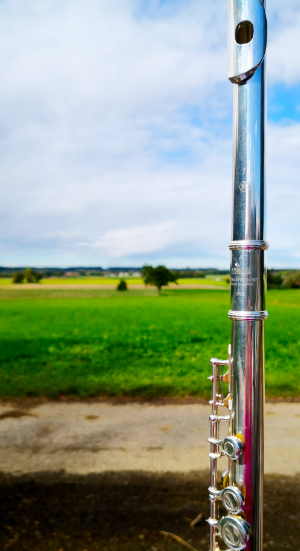May 2021
I made an email contact with "Flutissimo". That is a large fluteshop in Central Germany. There is the possibility to get in touch with a local employee in Munich to make an appointment. You set a financial limit, express your wishes for the equipment. The company looks for new, as good as new or reconditioned used models that can be tested in a relaxed setting and without time pressure.
I do want to buy a transverse flute! Well, it doesn't have to be a new model. But it should have ring keys and a silver headjoint. I don't really care about the brand. In terms of the idea, I think the Miyazawa versions are really great. That is certainly due to the intensive conversation with the representative of the company that I had months ago.
What is quite certain, however, is that you can only decide on one if you try out the flute. Each flute has different shaped and sized mouth openings, different angles of attack, different bridge designs on which the keys are arranged. The fingers and the lips must and should be able to decide regardless of the manufacturer's name.
Of course, I have a little problem because I can't play that many notes. As a result, I am not yet able to fully try out a higher quality flute as a beginner. That already worries me a little if I should start to become active in this project.
It is recommended to take the teacher with you. They know the student and can also provide a few pointers based on their own experience. I asked my teacher if she would be willing to accompany me. There are four shops in Munich that are eligible and then the Flutissimo option.
Exciting prospects.
 At the moment I don't find much opportunity to practice outside. It's raining all the time. If it doesn't rain, I don't have time. It's a bit of a shame.
At the moment I don't find much opportunity to practice outside. It's raining all the time. If it doesn't rain, I don't have time. It's a bit of a shame.
When I tell my acquaintances, friends and family that I started playing the transverse flute, I get many different reactions. Some are asking if I have gone mental? "Are you still not busy enough with learning to play the piano?", "Do you have so much time, so much boredom that you had to get yourself a new pastime?", "Jesus, I hate the whisteling of a flute.", "Have you gone crazy?", ...?
During the whole lockdown time and afterwards, I was always able to talk myself out of it: for time and financial considerations it's only about one lesson a month,... the various lockdowns didn't allow any more,... the flute was just lying around so idle,... no idea why it seems easy for me,... I've always liked the sound... ... ... ... !
One important point is in the foreground. Learning to play the piano, which I have dreamed of so intensely over the years, is infinitely difficult for me. I am blocked while learning, put myself under pressure, loosing the nerves all the time and cannot remain calm at all. It was certainly not a very good idea for me to start at a jazz school. Unfortunately, I'm a bit unreasonable and I would definitely not have let myself be talked out of it three years ago.
Up to now, of course, I have just as little ability to play the flute, I am rhythmically imprecise and often hit a wrong note. But I'm almost relaxed about making mistakes and learning new things. Can easily accept this unfinished state and it doesn't feel unfamiliar. I have the deep inner confidence that if I can't do it today, I'll learn to do it tomorrow. Maybe I was able to play the Flute in a past life. I like this beautiful thought.
These two contradictions could hardly be stronger. They bewilder me and I keep wondering whether I should retain this emotional imbalance? Maybe it's because I now have experience in learning an instrument and know what I can or may expect of myself. Know how difficult it is or how difficult it can be. And now I am able to be a little more patient with me during this process.
I am very fond of Aristotle's guidances. In terms of ethical balance, however, I wonder how I can eliminate this discrepancy.
At the same time, Aristotle published a few nice thoughts on the flute. The following can be read in Problemata XIX 43: “One listens to a song on the flute with greater delight than that on the lyre. Because the tones of the human voice and the flute merge well with each other through their relationship and affinity, as both are inspired by the breath. "